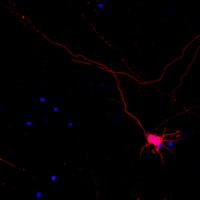Cortical and Clonal Contribution of Tbr2 Expressing Progenitors in the Developing Mouse Brain.
Vasistha, NA; García-Moreno, F; Arora, S; Cheung, AF; Arnold, SJ; Robertson, EJ; Molnár, Z
Cerebral cortex (New York, N.Y. : 1991)
25
3290-302
2015
Pokaż streszczenie
The individual contribution of different progenitor subtypes towards the mature rodent cerebral cortex is not fully understood. Intermediate progenitor cells (IPCs) are key to understanding the regulation of neuronal number during cortical development and evolution, yet their exact contribution is much debated. Intermediate progenitors in the cortical subventricular zone are defined by expression of T-box brain-2 (Tbr2). In this study we demonstrate by using the Tbr2(Cre) mouse line and state-of-the-art cell lineage labeling techniques, that IPC derived cells contribute substantial proportions 67.5% of glutamatergic but not GABAergic or astrocytic cells to all cortical layers including the earliest generated subplate zone. We also describe the laminar dispersion of clonally derived cells from IPCs using a recently described clonal analysis tool (CLoNe) and show that pair-generated cells in different layers cluster closer (142.1 ± 76.8 μm) than unrelated cells (294.9 ± 105.4 μm). The clonal dispersion from individual Tbr2 positive intermediate progenitors contributes to increasing the cortical surface. Our study also describes extracortical contributions from Tbr2+ progenitors to the lateral olfactory tract and ventromedial hypothalamic nucleus. | Immunohistochemistry | Mouse | 24927931
 |
ALK5-dependent TGF-β signaling is a major determinant of late-stage adult neurogenesis.
He, Y; Zhang, H; Yung, A; Villeda, SA; Jaeger, PA; Olayiwola, O; Fainberg, N; Wyss-Coray, T
Nature neuroscience
17
943-52
2014
Pokaż streszczenie
The transforming growth factor-β (TGF-β) signaling pathway serves critical functions in CNS development, but, apart from its proposed neuroprotective actions, its physiological role in the adult brain is unclear. We observed a prominent activation of TGF-β signaling in the adult dentate gyrus and expression of downstream Smad proteins in this neurogenic zone. Consistent with a function of TGF-β signaling in adult neurogenesis, genetic deletion of the TGF-β receptor ALK5 reduced the number, migration and dendritic arborization of newborn neurons. Conversely, constitutive activation of neuronal ALK5 in forebrain caused a marked increase in these aspects of neurogenesis and was associated with higher expression of c-Fos in newborn neurons and with stronger memory function. Our findings describe an unexpected role for ALK5-dependent TGF-β signaling as a regulator of the late stages of adult hippocampal neurogenesis, which may have implications for changes in neurogenesis during aging and disease. | Immunohistochemistry | | 24859199
 |












